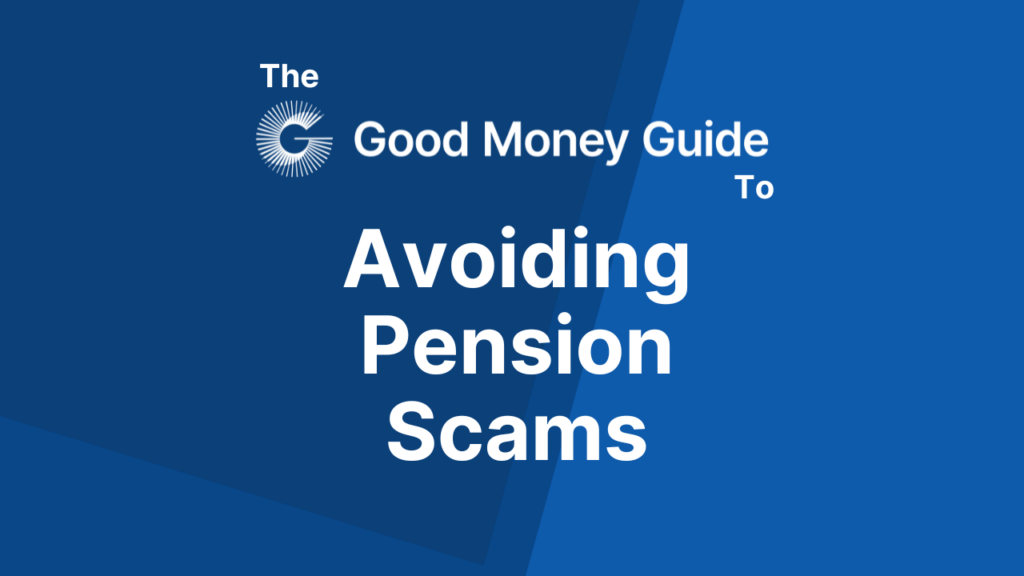Britons are still losing millions of pounds to pension scams each year, despite tough new anti-fraud rules that have slowed transfers and frustrated savers.
Fresh analysis shows that while the number of reported pension scam cases has fallen since 2021, the average amount lost per victim has more than trebled, sparking concern that determined fraudsters are still finding ways to raid retirement pots.
Figures from Action Fraud show 559 people reported being victims of pension fraud in 2023, up from 420 in 2022, with average losses hitting £46,959. That compares to average losses of £21,000 in 2022 and just £15,000 in 2021.
When Good Money Guide first reported on pension scams in 2019, the Financial Conduct Authority (FCA) and The Pensions Regulator (TPR) warned that five million people were at risk of being tricked out of their savings. Back then, victims were losing around £82,000 each and reports of scams were rising by 45%, with fraudsters stealing £2m in just six months.
The scams typically target savers aged 45–65 with promises of high returns in exotic investments such as overseas property, forestry, biofuels or renewable energy bonds. FCA research found that nearly one in four people (23%) in this age group would consider such offers, despite regulators describing them as “high-risk and unlikely to be suitable for pension savings”. Others are lured with promises to access their pensions early, despite the 55 age limit and the crippling tax penalties this triggers. Even today, 17% of 45–54-year-olds say they would be tempted by early access.
Most common types of pension scams in the UK
The UK banned unsolicited pensions cold calls in 2019, with fines of up to £50,000, but they remain a key source of scams. Citizens Advice says around 11 million such calls were still made in a single year, and FCA research shows almost a quarter (23%) of savers would still talk to a cold caller or request more details.
1. Pension Liberation (Early Access) Scams
What it is: Fraudsters promise to unlock your pension before age 55, often calling it a “loophole”, “cashback” or “advance”.
The catch: Early access is almost never legal except in extreme circumstances (ill health). Victims end up paying huge tax penalties (55%+) to HMRC and often lose the rest of their pot to the scammers.
Why it works: People are tempted by the idea of getting their hands on their pension early, especially during financial hardship.
2. Fake Investment Opportunities
What it is: Scammers persuade you to transfer your pension into high-risk or entirely fake schemes, such as overseas property, forestry, biofuels, storage units or renewable energy bonds.
The catch: The investments either don’t exist or are deliberately structured to strip out your money in fees.
Why it works: They dangle “guaranteed high returns” and dress the scheme up as exclusive or time-limited to create urgency.
3. Clone Firms and Impersonation Scams
What it is: Criminals pretend to be FCA-authorised firms or advisers, using real company names, registration numbers and fake websites or email domains.
The catch: You think you’re moving your pension to a reputable firm — but the scammers intercept the money and disappear.
Why it works: The branding and documents often look convincing, and people don’t always check the FCA warning list or verify contact details independently.
All three scams rely on getting you to transfer your pension pot away from its current safe home, after which it’s almost impossible to recover.
How to stay safe
- Reject unexpected pension offers online, on social media or over the phone
- Check any adviser or firm on the FCA Register
- Don’t be rushed or pressured into transferring
- Report suspicious financial scams to the FCA, TPR or Action Fraud
Pension transfers are being slowed down by scammers
In late 2021, the government introduced the Conditions for Transfers Regulations, giving pension trustees new powers to block or delay transfers if they spot warning signs. Transfers can be “amber flagged” if they involve overseas investments, or “red flagged” if the saver refuses guidance or fails to provide information.
However, new data shows the crackdown may be ensnaring the wrong people.
Analysis by XPS Group shows 94% of transfers they review now raise at least one scam warning flag. Yet government data on 290,000 transfers found only 1% were flagged for genuine scam risk — and 96% of amber-flagged transfers went ahead without incident. Only 300 transfers were red-flagged, mostly for paperwork errors or missing MoneyHelper guidance, not evidence of scams.
Private pension provider PensionBee warns that the system has created “huge inefficiencies, unnecessary worries and consumer detriment”, with some providers raising flags “to slow or stop transfers out”. Becky O’Connor, the firm’s Director of Public Affairs, said:
“The DWP’s own data indicates that a sledgehammer has been used to crack a nut… The vast majority of red and amber flags are not raised because of genuine scam risk.”
The Department for Work and Pensions’ own review confirms that overseas investments are the most common trigger for amber flags, despite being included in almost all mainstream pension funds

Richard is the founder of the Good Money Guide (formerly Good Broker Guide), one of the original investment comparison sites established in 2015. With a career spanning two decades as a broker, he brings extensive expertise and knowledge to the financial landscape.
Having worked as a broker at Investors Intelligence and a multi-asset derivatives broker at MF Global (Man Financial), Richard has acquired substantial experience in the industry. His career began as a private client stockbroker at Walker Crips and Phillip Securities (now King and Shaxson), following internships on the NYMEX oil trading floor in New York and London IPE in 2001 and 2000.
Richard’s contributions and expertise have been recognized by respected publications such as The Sunday Times, BusinessInsider, Yahoo Finance, BusinessNews.org.uk, Master Investor, Wealth Briefing, iNews, and The FT, among many others.
Under Richard’s leadership, the Good Money Guide has evolved into a valuable destination for comprehensive information and expert guidance, specialising in trading, investment, and currency exchange. His commitment to delivering high-quality insights has solidified the Good Money Guide’s standing as a well-respected resource for both customers and industry colleagues.
To contact Richard, please see his Invesdaq profile.




